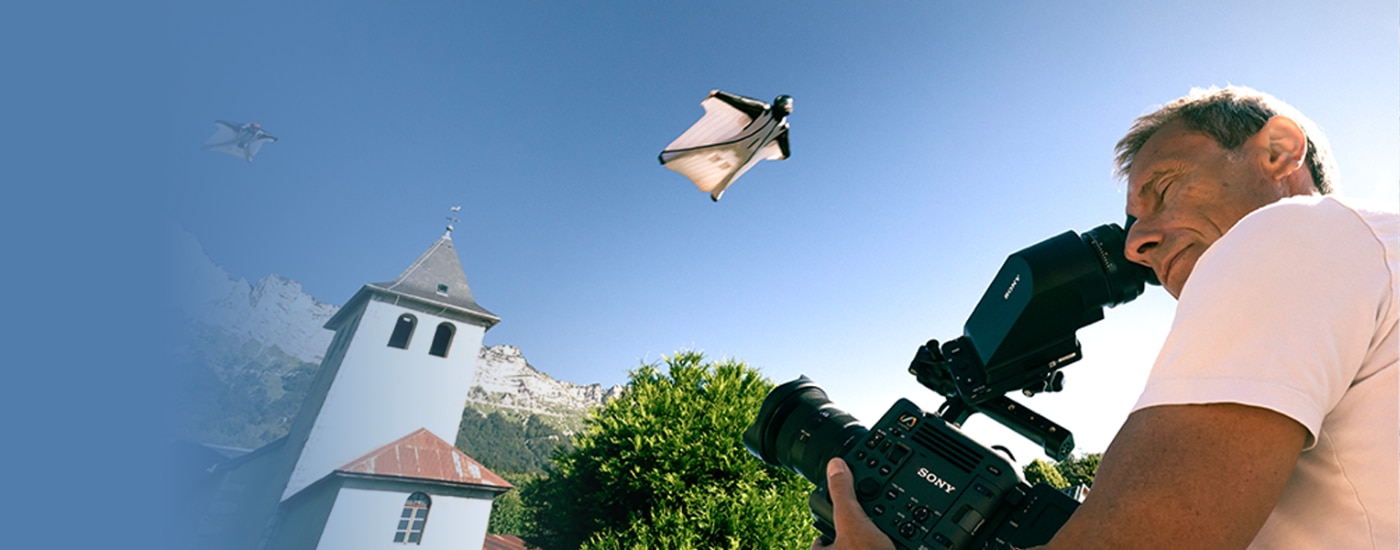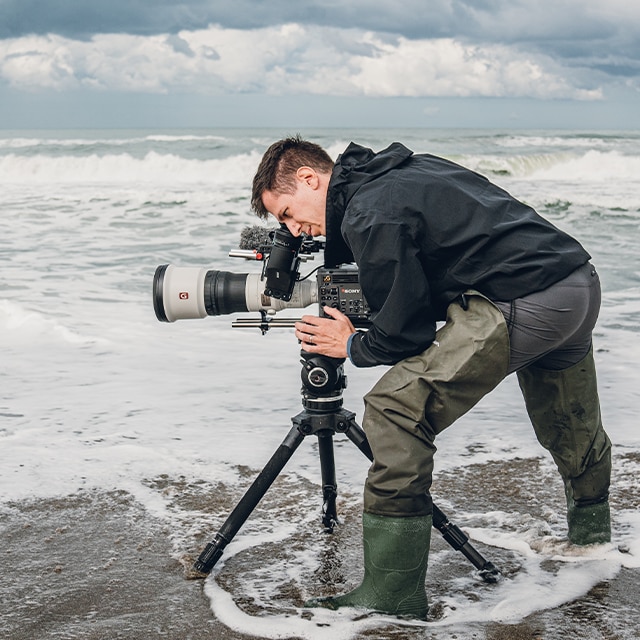Capturing 174 mi/h Wing Suit flyers with Sony BURANO
Thierry Donard is an accomplished cinematographer who specializes in extreme sports.

Introduction
Thierry Donard, based in Switzerland, is an accomplished cinematographer who specializes in extreme sports as well as natural history. When he was asked if he wanted to test Sony’s new BURANO digital camera, he set out in his own words “to see if I could break it” by using it to film the particularly challenging world of wing suit flying.
Wing suit flyers frequently reach speeds of 174 mi/h, flying from often very remote cliffs and mountain tops, plunging from brilliant sunlight into the deep shadows of mountain valleys, skimming past trees and buildings at incredible speeds. Thierry’s film follows one of the sport’s most extreme flyers, Vincent Cotte.
Autofocus put to the ultimate test
Thierry shot the film using Sony E-Mount lenses, which enabled BURANO’s programmable auto focus system, allowing him to track and follow the wing suit flyers as they approached and flew past him just yards away at speeds of around 174 mi/h. Whether he was shooting with a wide-angle lens or a 600 mm lens, the camera’s AI-based face recognition software was able to keep the faces and eyes of the approaching flyers in crisp, sharp focus. Auto focus was also a big help for the drone shots.
Two years ago, I wasn’t a fan of Auto Focus, now I can’t work without it.
Flying Burano
To get the incredible drone shots in the film, Thierry built a couple of custom FPV drones, including a drone configured to carry the BURANO shooting sideways to track the wing suit flier. The built-in variable ND filter, auto exposure and auto focus, plus BURANO’s compact size, make it a great camera for drone work.
In terms of image quality, Thierry believes that BURANO is the best camera he has ever used. The exceptional dynamic range and impressive color response, along with the ability to shoot with either a base ISO of 800 or 3200, allow him to capture beautiful images from dawn to dusk.
He was really impressed by the way it held on to details and textures even in the most extreme highlights and shadows.
The best dynamic range I’ve seen in my life… I’ve already used the FX6 and this has great dynamic range when using the S-Log3, but this camera takes it to another level … it blew my mind!”
Variable ND and IBIS
The camera’s built-in variable ND filter was used to automatically compensate for the extreme exposure changes that occurred as the flyers jumped from the brilliantly lit mountain tops into the darkness of the valley floor.
Another BURANO feature that Thierry found extremely useful is its ability to stabilize the recorded images via its built-in IBIS stabilization system. This feature proved to be incredibly effective when the camera was mounted to Vincent’s chest to capture the incredible point-of-view footage seen in the film.
Only seconds to get the shot
“With other brands you don’t want to turn the camera off because it takes too long to come back on, but with this camera you can turn it off and on, and immediately it works.”
When filming wildlife or extreme sports, you often only get one chance to get the shot. The wing suit flyers could spend hours getting into position and preparing for their jump. The weather must be exactly right; the drone must be in the air and ready. Then the flyers jump and there are only seconds to get the shot as they fly past. Thierry found BURANO to not only be completely reliable but also very quick to use, turning on almost instantly. When you can only get 2 or 3 shots in a day, every second counts. Being able to turn the camera off when not needed, along with its low power consumption, meant that Thierry only needed 2 V-Lock batteries for a full day of shooting.
Ready to go out of the box
Thierry was immediately impressed by the camera’s ergonomics. He found it amazingly small and compact, something particularly important when you need to hike many miles to the filming location. Unlike many cameras that need additional accessories to make it usable, Thierry felt that BURANO was ready to go straight out of the box. The viewfinder’s monocular gives a clear and accurate image in all light conditions, the well-thought-out top handle making the camera easy to carry and transport. Thierry also used the optional GP-VR100 Smart Grip and arm, which makes it even easier to access the camera’s controls via the quick menu when using the camera on your shoulder. The arm proved to be particularly beneficial for the fast pass-by shots and the running shots in the forest.
The film was shot using the X-OCN codec. Thierry used a mix of the camera’s full frame 8K and 6K shooting modes as well as the 4K Super 35 mm crop mode, which allowed him to shoot at up to 120 fps. The film was edited and graded with DaVinci Resolve, where the workflow friendly 16-bit X-OCN material can be handled natively: no need to transcode or use proxies with most modern computers.
“One of the most challenging parts of the shoot was handing the camera back to Sony at the end. I really wanted to keep the camera.





